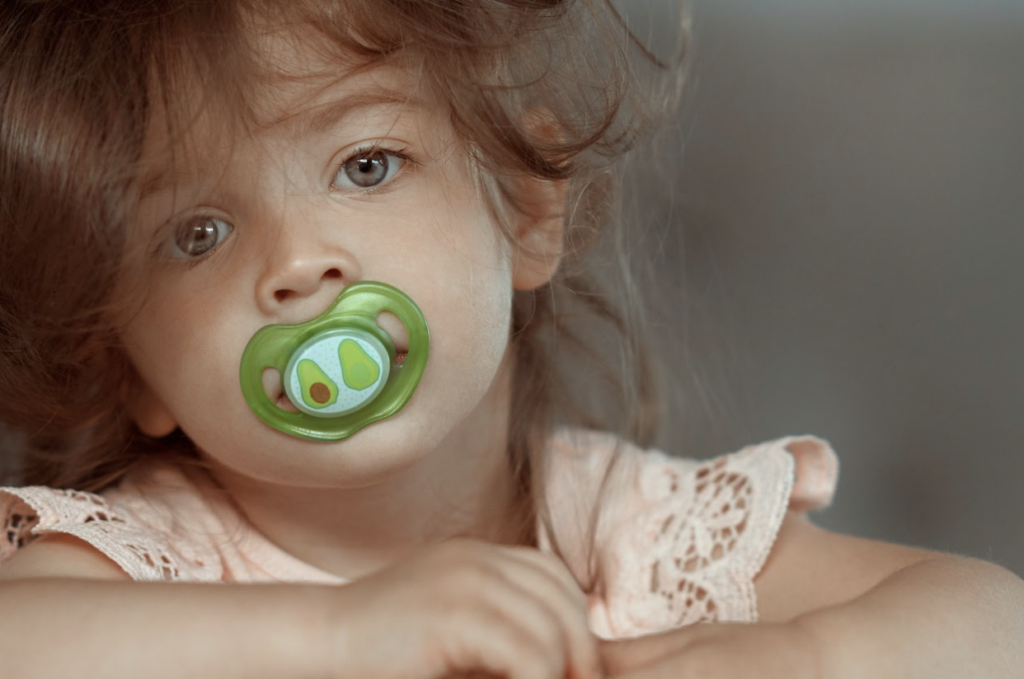
Pacifiers have been a popular soothing tool for babies for generations. Parents often turn to pacifiers to comfort and calm their little ones. While pacifiers can provide temporary relief, many parents wonder about their long-term impact on their child’s development. In this blog post, we will explore the pros and cons of pacifier use and offer guidance on finding the right balance for your child’s overall well-being.
The Benefits of Pacifier Use:
- Soothing and Comfort: Pacifiers can help babies self-soothe and provide a sense of security and comfort. They can be particularly helpful during periods of teething, sleep training, or when infants need a way to calm themselves.
- Reduced Risk of Sudden Infant Death Syndrome (SIDS): Research suggests that pacifier use during sleep can reduce the risk of SIDS. The American Academy of Pediatrics recommends offering a pacifier at bedtime and naptime once breastfeeding is established.
- Pain Relief: Pacifiers can provide temporary relief from discomfort caused by earaches, pressure changes during air travel, or other minor ailments.
Potential Concerns and Considerations:
- Dental Development: Extended pacifier use beyond the age of two or three can affect dental development. Prolonged sucking on pacifiers can lead to improper alignment of teeth or changes in the shape of the palate. It is important to monitor your child’s dental development and consult with a pediatric dentist if you have concerns.
- Speech and Language Development: Excessive pacifier use can potentially impact speech and language development. Frequent use of pacifiers can limit opportunities for infants to practice vocalization and babbling, which are important for language acquisition. It is crucial to encourage verbal communication and limit pacifier use during speech development stages.
Finding the Right Balance:
- Introduce Pacifiers Mindfully: If you choose to offer a pacifier, introduce it mindfully and ensure that it doesn’t interfere with breastfeeding during the early weeks. It is advisable to wait until breastfeeding is well-established before introducing a pacifier.
- Limit Usage: Gradually reduce and limit pacifier use as your child grows older. Introduce other soothing techniques, such as cuddling, rocking, or offering a favorite blanket or stuffed animal, to help your child learn alternative ways to self-soothe.
- Encourage Positive Oral Health Habits: Help your child develop good oral health habits by regularly cleaning and inspecting the pacifier for any signs of damage or wear. Discourage sharing pacifiers and avoid dipping them in sugary substances.
- Monitor Dental Development: Keep a close eye on your child’s dental development and consult with a pediatric dentist if you notice any issues or concerns related to pacifier use.
Pacifiers can be a helpful tool in soothing and comforting babies, but it’s important to find the right balance and be mindful of their potential impact on your child’s development. As with any parenting decision, it is essential to weigh the benefits and potential drawbacks while considering your child’s individual needs. By being aware of the potential concerns and following the recommended guidelines, you can support your child’s healthy development and promote positive oral health habits. Remember, open communication with your child’s pediatrician and Providence pediatric dentist can provide valuable guidance throughout this journey of parenting and pacifier use. Please contact Providence Pediatric Dentistry to schedule your child’s next appointment!





